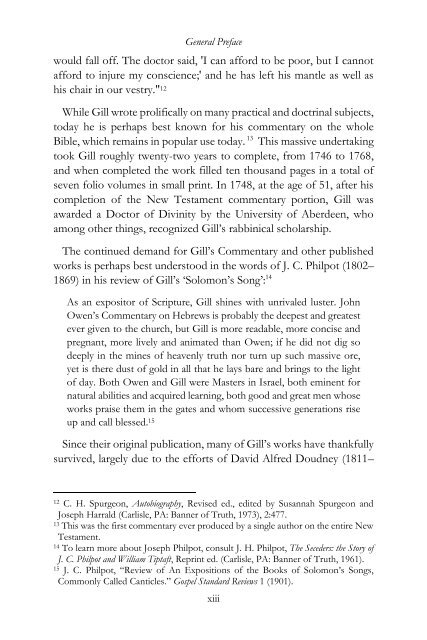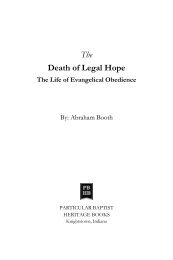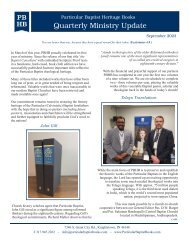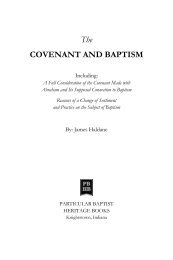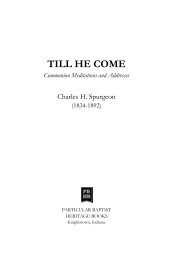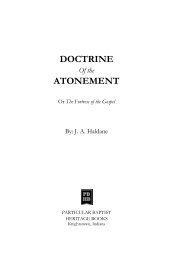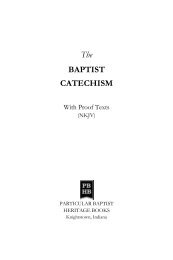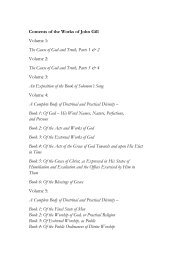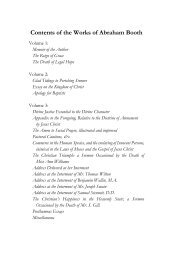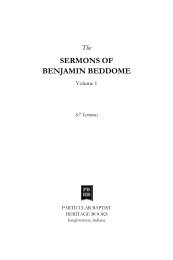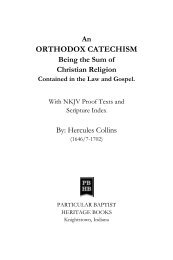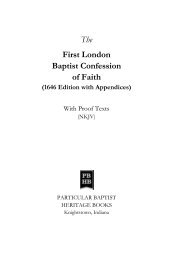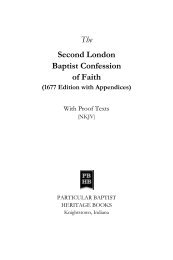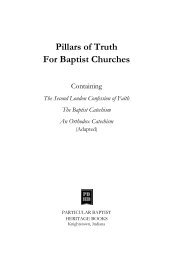the works of john gill vol2 SAMPLE
You also want an ePaper? Increase the reach of your titles
YUMPU automatically turns print PDFs into web optimized ePapers that Google loves.
General Preface<br />
would fall <strong>of</strong>f. The doctor said, 'I can afford to be poor, but I cannot<br />
afford to injure my conscience;' and he has left his mantle as well as<br />
his chair in our vestry." 12<br />
While Gill wrote prolifically on many practical and doctrinal subjects,<br />
today he is perhaps best known for his commentary on <strong>the</strong> whole<br />
Bible, which remains in popular use today. 13 This massive undertaking<br />
took Gill roughly twenty-two years to complete, from 1746 to 1768,<br />
and when completed <strong>the</strong> work filled ten thousand pages in a total <strong>of</strong><br />
seven folio volumes in small print. In 1748, at <strong>the</strong> age <strong>of</strong> 51, after his<br />
completion <strong>of</strong> <strong>the</strong> New Testament commentary portion, Gill was<br />
awarded a Doctor <strong>of</strong> Divinity by <strong>the</strong> University <strong>of</strong> Aberdeen, who<br />
among o<strong>the</strong>r things, recognized Gill’s rabbinical scholarship.<br />
The continued demand for Gill’s Commentary and o<strong>the</strong>r published<br />
<strong>works</strong> is perhaps best understood in <strong>the</strong> words <strong>of</strong> J. C. Philpot (1802–<br />
1869) in his review <strong>of</strong> Gill’s ‘Solomon’s Song’: 14<br />
As an expositor <strong>of</strong> Scripture, Gill shines with unrivaled luster. John<br />
Owen’s Commentary on Hebrews is probably <strong>the</strong> deepest and greatest<br />
ever given to <strong>the</strong> church, but Gill is more readable, more concise and<br />
pregnant, more lively and animated than Owen; if he did not dig so<br />
deeply in <strong>the</strong> mines <strong>of</strong> heavenly truth nor turn up such massive ore,<br />
yet is <strong>the</strong>re dust <strong>of</strong> gold in all that he lays bare and brings to <strong>the</strong> light<br />
<strong>of</strong> day. Both Owen and Gill were Masters in Israel, both eminent for<br />
natural abilities and acquired learning, both good and great men whose<br />
<strong>works</strong> praise <strong>the</strong>m in <strong>the</strong> gates and whom successive generations rise<br />
up and call blessed. 15<br />
Since <strong>the</strong>ir original publication, many <strong>of</strong> Gill’s <strong>works</strong> have thankfully<br />
survived, largely due to <strong>the</strong> efforts <strong>of</strong> David Alfred Doudney (1811–<br />
12 C. H. Spurgeon, Autobiography, Revised ed., edited by Susannah Spurgeon and<br />
Joseph Harrald (Carlisle, PA: Banner <strong>of</strong> Truth, 1973), 2:477.<br />
13 This was <strong>the</strong> first commentary ever produced by a single author on <strong>the</strong> entire New<br />
Testament.<br />
14 To learn more about Joseph Philpot, consult J. H. Philpot, The Seceders: <strong>the</strong> Story <strong>of</strong><br />
J. C. Philpot and William Tiptaft, Reprint ed. (Carlisle, PA: Banner <strong>of</strong> Truth, 1961).<br />
15 J. C. Philpot, “Review <strong>of</strong> An Expositions <strong>of</strong> <strong>the</strong> Books <strong>of</strong> Solomon’s Songs,<br />
Commonly Called Canticles.” Gospel Standard Reviews 1 (1901).<br />
xiii


